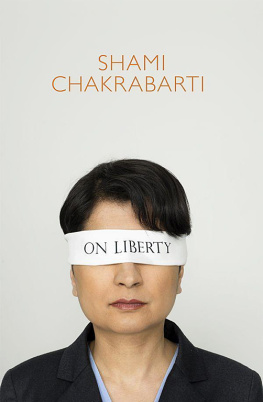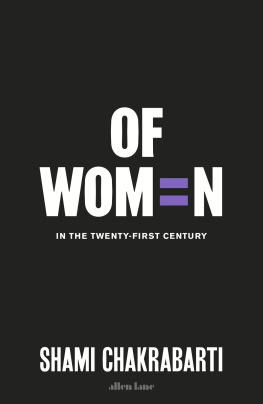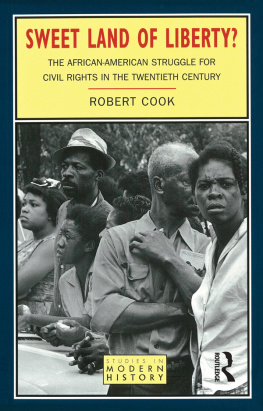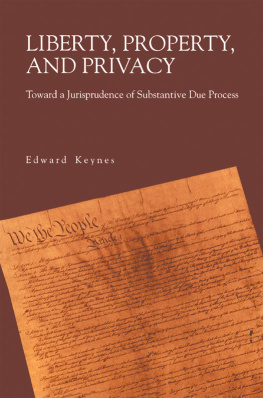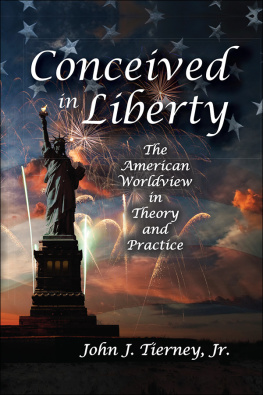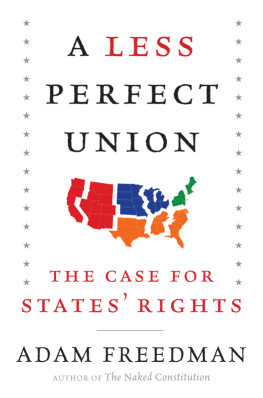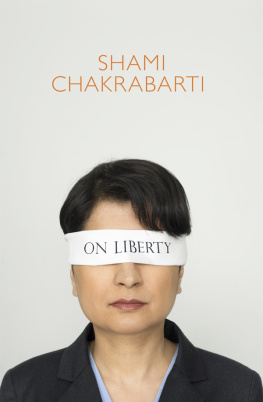
Shami Chakrabarti
ON LIBERTY

Contents
For my son the Bean
Introduction
This book has been a dozen years or perhaps a lifetime or several in the making. It is my story and the story of Liberty (the National Council for Civil Liberties, NCCL) in the difficult and soul-defining decade or so leading up to its eightieth birthday. It is also more than this. On Liberty is an attempt to explain both the values and some of the important struggles of so many people who believe in the precious treasure of fundamental rights and freedoms that binds people and democratic societies together. From 9/11 to unprecedented state surveillance and attacks on the Human Rights Act; my leap from the Home Office, to the birth of my son and death of my mother. This is an account of my personal and political journey.
These are challenging times for human rights. The ill-judged and misnamed War on Terror has morphed into a permanent state of exception becoming the rule. This has been triggered not only by horrific crimes against people and the terror of collapsing towers but by collapsing markets, economies and institutions. No one is above the law. Yet some have readily decided that the rule of law is too exacting and human rights principles too expensive in times of insecurity and austerity.
As I write, some senior figures in the Conservative Party and the UK Independence Party that has so tweaked its tail propose abolishing the Human Rights Act and withdrawing from the European Convention on Human Rights. They are wrong. This is written as much for you (if you prove open or curious enough to dip into it) as for any of us. Our responsibility is to previous generations who fought for rights and freedoms and to future ones, for whom we hold them in trust.
At Liberty House in Westminster, I have the privilege of working with the kindest, cleverest and most creative young professionals. We always say that reading sympathetic newspapers while listening to chattering radio and sipping a fair-trade organic brew is all very well in the kitchen on your own time, but campaigning it is not. Human rights sceptics and critics have had undue influence over the last few years and that has been reflected in the media and in government policy and rhetoric. It is exactly these naysayers that we must persuade that far from being trivial luxuries to be sacrificed in times of strife, our small bundle of non-negotiable freedoms upheld by the rule of law is essential to everything that makes our lives worth living from protection against torture and the right to a fair trial and private life to freedoms of conscience, speech and association. Lawyers can number, translate and contest the application of our rights to particular circumstances. But these values can be summed up by three little words: dignity, equality and fairness. These are the ideas from which our various human rights flow and for reasons this book explains, the greatest of these is equality.
Liberty was formed in 1934 in an ostensibly very different world. There was no internet, CCTV or DNA profiling. However, everyone had recent experience of the horrors of war. Many endured genuine economic hardship. The far right was gaining ground and national newspapers regularly voiced their disgust at the arrival of refugees from Eastern Europe. But the particular jolt for Libertys founders was seeing hunger marchers from the North of the country meeting an especially brutal reception at the hands of the Metropolitan Police in Londons Hyde Park in November 1932. The marchers brought a petition a million signatures strong and protested against a 10 per cent cut in unemployment benefit and the means test imposed the previous year. Whats more, they had been infiltrated by undercover police acting as agents provocateurs , inciting demonstrators to violence so as to justify a violent police response. In the intervening years some things have changed for the better and some not nearly enough.
Our founders formed the National Council for Civil Liberties to keep watch over the entire spirit of British liberty. Today they might have blogged and tweeted this resolve. After their inaugural meeting on 24 February 1934 in the crypt of St Martin-in-the-Fields in Trafalgar Square, they announced their new organization in a letter to the Manchester Guardian . The signatories included Clement Attlee, Vera Brittain, H. G. Wells, Edith Summerskill MP and the first Secretary of the NCCL, Ronald Kidd. Kidd was a civil servant, journalist, publisher and even actor before finding his place in the world as a civil liberties campaigner. He and a small group of brave people of values and ideals set in motion a campaign which would become the oldest human rights group in the UK.
After the Second World War freedom struggles around the world found international solidarity and intellectual cohesion within the framework of the 1948 Universal Declaration of Human Rights. The UDHR is a global expression of rights to which all humans are inherently entitled. Regional and local documents followed, including Churchills legacy, the European Convention on Human Rights. This is an essential text that I came to know as a law student in the early 1990s when human rights were an almost exotic international study option. I applied it later as a government lawyer in the Home Office while advising on and defending decisions, policy and legislation in the European Court of Human Rights (ECtHR). You might say that I am a Jedi Knight who began on the dark side of the force.
In 1998, a young New Labour government took a bill through Parliament with significant cross-party support incorporating most of the Convention articles into UK law. Now they could be enforced in local courts with a greater understanding of domestic culture and context and without claimants having to make the sometimes decade-long hike to Strasbourg. This was an incredibly important moment for the UK. The Human Rights Act provided our modern Bill of Rights. It is this short but essential list of protections for the vulnerable against the powerful, the individual against the state and their availability to people in the United Kingdom that has become so controversial in recent years.
My work at Liberty has been second only to motherhood as the joy and privilege of my life. Yet just as I never expected to find work that would be quite so rewarding, I never expected to have to make arguments against internment, kidnap and torture in freedoms name, or for the retention and defence of universal human rights in principle in one of the oldest unbroken democracies on earth.
For just as a belief in fundamental rights and freedoms is common in all areas of mainstream democratic politics, so it seems these days is their denial. Over the years I have talked to many highly educated and senior UK politicians who espouse a belief that an independent or unelected judiciary is somehow undemocratic and that the only legitimate power is their own. These increasingly shrill voices lack both intellectual humility and constitutional literacy or understanding of the foundations upon which our democracy rests. To elect judges is like nominating a referee from one or other football team. It would ensure that in times of strife and even more routinely, the roar of the crowd rules and Barabbas goes free. I sometimes wonder whether this new, arrogant and increasingly detached political class has thought at all deeply about what democracy means and what it needs to survive.
By analogy, many of us are lectured daily about the virtues of unfettered markets; not just as the best means of providing material benefits to the greatest number, but as a kind of evolutionary natural selection which must be unencumbered by rules and regulation. But even the most bloodless free-marketeer generally understands the essential nature of having rules of the game. At the very least, there must be effective criminal law to prevent people from robbing each other, civil law to bind them to the bargains which they have struck with one another and probably a great deal of complex company, competition and other regulatory law besides. Without these laws todays market eats itself and descends into tomorrows monopoly, oligarchy or gangster paradise.
Next page
